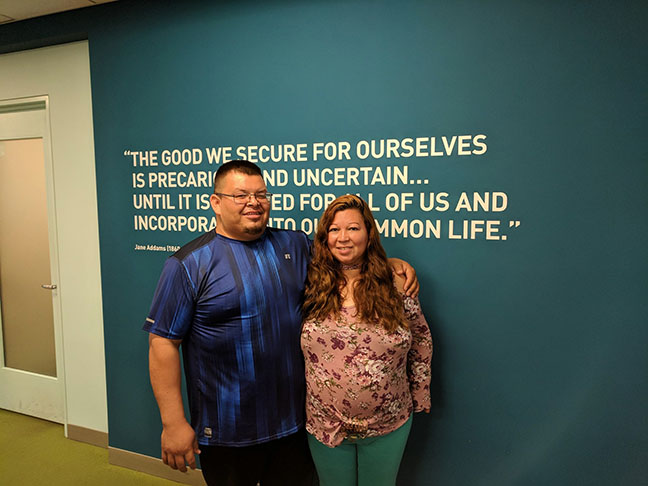
Roberto and Ana can breathe a lot easier these days. The couple, who live in the Chicago neighborhood of Gage Park, has been married for six years. Roberto had lived in the United States undocumented for several years when they finally were able to pursue a petition for him to become a lawful permanent resident. He received his green card in July 2018.
“I kept asking, why should I put in the application? Why do I need my documents? But then one day I found out there were ICE [U.S. Immigration and Customs Enforcement] officers looking for someone in our neighborhood and that changed my way of thinking.”
The only problem was money.
“We can only afford to live day-to-day,” Ana says. As a teenager, Ana fled alone to the United States from El Salvador. She suffered a trauma so great during that time she now has amnesia. She has a difficult time recalling the past but she wears the scars on her body. One arm has been abused so badly, Ana says, “the tendons are dead.” The other arm frequently loses feeling.
Roberto is the sole provider for the family because Ana cannot work and does not receive disability benefits.
“When I first met him I could work but I suffered a lot,” Ana says. “He said to me, ‘when we get married I am going to look out for you.’ I told him I am alone in this world.”
The strong bond and Ana’s fear of separation pushed them to apply to adjust Roberto’s status.
Due to their lack of financial resources, it was important for Roberto and Ana to work with affordable lawyers. Ana asked friends at Heartland Alliance’s Marjorie Kovler Center, where she had received counseling for her own trauma, if they could help. The Kovler Center referred the couple to NIJC.
Ana and Roberto obtained a free legal screening and representation at NIJC through the City of Chicago’s Legal Protection Fund. The Fund launched in January 2017 to help low-income immigrant families in Chicago obtain free immigration legal services. Legal counsel is critical to ensure families understand their rights and avoid missteps that could result in a denial of their application. But with government filing fees alone costing hundreds of dollars, Ana says that without the Fund, she and Roberto would not have been able to pay a lawyer to help them adjust Roberto’s status.
After working with NIJC for one year, Roberto secured lawful permanent residence. In five years, he will be eligible to apply for citizenship.
“Now my life is totally different. I can walk down the street without the fear of anything. When you are here illegally you say, ‘Why should I buy a car? Tomorrow I may be deported.’ Basically, you are living in a shadow and you don’t want to own anything,” Roberto says.
With Roberto’s status secured, Roberto and Ana can openly live their dreams.
“I am very happy we can plan and dream. Plans and dreams become reality when you give them a purpose,” Ana says.
Listen:
listen
Roberto and Ana explain how NIJC lawyers helped them.
"The lawyer informed me of everything. She did all the work she like a guide. Truthfully looking back I see this work is very heavy a lot of paperwork, a lot of work."
listen
Find out what worried Ana most.
“He would go to work and I was always close to the window because I was worried I would get a call or something. I would walk around with my phone in my hand, always alert, afraid of hearing any bad news.
listen
Roberto and Ana explain the hurdles many immigrants go through financially.
“We never saved; how could we?” Ana explains. “We earn so little that at the end of the day you only have enough to pay for your rent and your bills. We couldn’t save, even though we wanted to.”
listen
Ana and Roberto's dreams are now that he has citizenship
“We have a lot of plans. We need to stabilize ourselves economically first. After that we want to save money for the citizenship fees. We have a big dream and that is to buy a house.”
For more information about NIJC’s immigration legal services, including free services provided for Chicago residents through the Legal Protection Fund, visit immigrantjustice.org/services.
*This article has been corrected to properly reflect the dates of Roberto's legal process.

